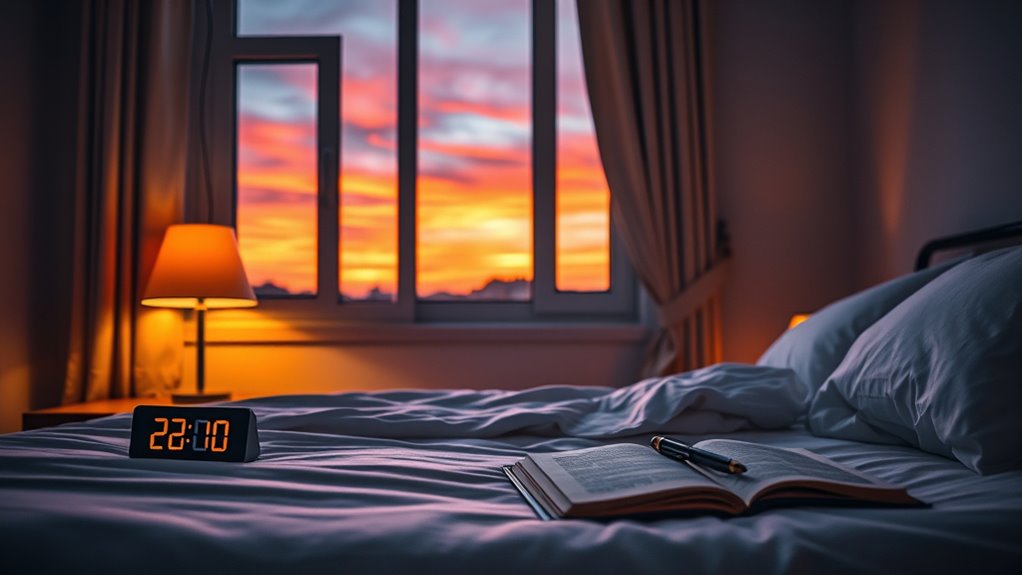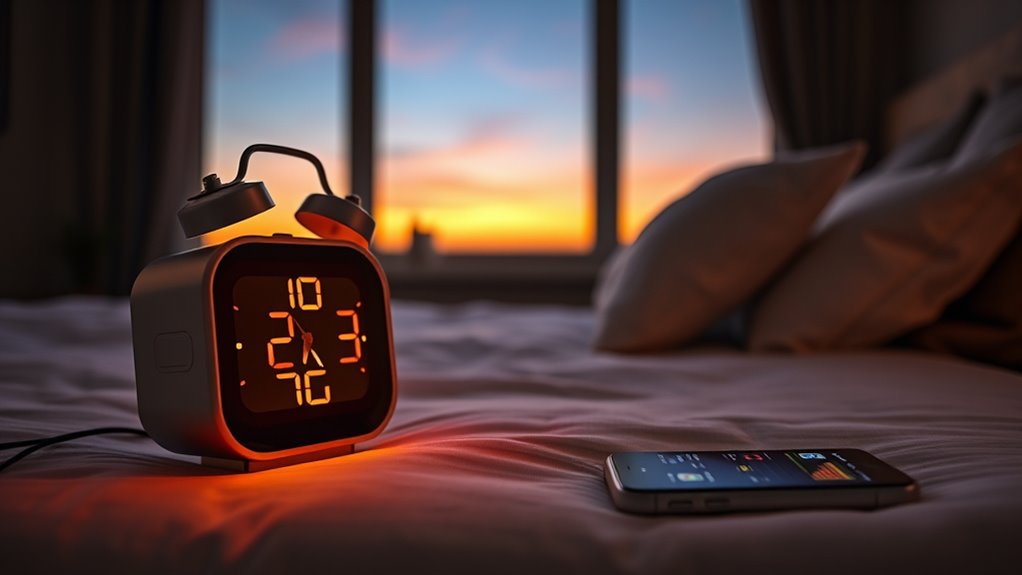To adjust your sleep schedule after crossing time zones, start shifting your sleep times by 1-2 hours each day before your trip. Once there, get plenty of natural morning light and stay active during the day to help reset your internal clock. Create a comfortable sleep environment by keeping your room dark and quiet, and consider supplements like melatonin if needed. Continue with good sleep hygiene, and you’ll soon adapt more smoothly. If you keep exploring, you’ll find more helpful tips for overcoming jet lag.
Key Takeaways
- Gradually shift your sleep times by 1-2 hours daily before traveling to ease adaptation.
- Expose yourself to natural morning light to regulate your circadian rhythm and signal wakefulness.
- Create a sleep-friendly environment: keep your room cool, dark, and quiet using blackout curtains and earplugs.
- Consider melatonin supplements to help reset your internal clock, especially if falling asleep is difficult.
- Maintain consistent sleep and wake times after arrival and prioritize good sleep hygiene for quicker adjustment.

Traveling across time zones can disrupt your body’s internal clock, making it hard to fall asleep or wake up at your desired times. When your circadian rhythm is thrown off, you often experience fatigue, irritability, and difficulty concentrating. The good news is that you can adjust your sleep schedule more smoothly by employing effective strategies. One of the key approaches involves using jet lag remedies that work in tandem with optimizing your sleep environment. Creating the right conditions for sleep can help reset your internal clock faster and improve your overall rest.
Start by gradually shifting your sleep schedule before your trip, if possible. Adjust your bedtime and wake time by an hour or two each day leading up to your departure. This slow transition helps your body adapt gradually to the new time zone, reducing the shock of sudden changes. Once you arrive, expose yourself to natural light during the day, especially in the morning. Sunlight helps regulate your circadian rhythm and signals your body to stay awake during the day and sleep at night. Conversely, limit exposure to bright screens and artificial lights in the evening, which can interfere with melatonin production and make falling asleep more difficult.
Gradually shift your sleep schedule before traveling and get morning sunlight to reset your internal clock.
Your sleep environment plays a vital role in adjusting to new time zones. Make sure your sleeping area is cool, dark, and quiet. Use blackout curtains or an eye mask to block out light, and consider earplugs or white noise machines to drown out any disruptive sounds. A comfortable mattress and pillows also contribute to better sleep quality, which is essential when you’re trying to reset your internal clock. If you’re in a hotel or unfamiliar place, bring familiar items like your pillow or sleep mask to create a more comforting environment. Additionally, automation in sleep technology is increasingly used to optimize sleep conditions through smart devices and apps.
In addition to environmental adjustments, consider using jet lag remedies such as melatonin supplements. Taking melatonin in the evening can help signal to your body that it’s time to sleep, especially if you’re experiencing difficulty falling asleep. Remember to start with a low dose and consult a healthcare provider beforehand. Staying well-hydrated and avoiding caffeine and alcohol close to bedtime also supports your efforts to reset your sleep schedule.

Magicteam White Noise Machine with 20 Non Looping Natural Soothing Sounds Memory Function 32 Levels of Volume Powered by AC or USB and Sleep Sound Timer Therapy for Baby Kids Adults Black
❤20 Non-Looping Sleep Sounds: White noise ,Brown noise, pink noise, blue noise, fan,brook, rain, ocean,bird and Bonfire,suitable for...
As an affiliate, we earn on qualifying purchases.
Frequently Asked Questions
Can Melatonin Supplements Help Reset My Sleep Schedule?
Yes, melatonin supplements can help reset your sleep schedule. To maximize their effectiveness, take the appropriate melatonin dosage, usually 0.5 to 5 mg, about an hour before bedtime. Combine this with sleep hygiene techniques like maintaining a consistent sleep schedule, avoiding screens before bed, and creating a relaxing environment. These strategies work together to help your body adjust more quickly to new time zones.
How Long Does It Typically Take to Adjust After Crossing Multiple Time Zones?
Imagine your body as a clock needing rewinding after a long trip. Typically, it takes about one day per time zone crossed to fully adjust, but it can vary. Jet lag remedies like exposure to natural light and sleep hygiene tips accelerate this process. Staying consistent with sleep and wake times, even if tired, helps reset your internal clock faster, so give yourself a few days to feel fully back on track.
Are There Specific Foods or Drinks That Can Aid Sleep Adaptation?
You can boost your sleep adaptation by focusing on hydration strategies and sleep-inducing snacks. Drink plenty of water throughout the day to stay hydrated, which helps your body adjust more efficiently. Incorporate sleep-inducing snacks like bananas, almonds, or herbal teas before bed, as they contain natural compounds that promote relaxation. Avoid caffeine and alcohol, and maintain a consistent meal schedule to support your body’s internal clock during the progression.
Should I Gradually Shift My Sleep Times Before Traveling?
Yes, you should gradually shift your sleep times before traveling; it’s like rewiring your entire circadian rhythm. This simple step dramatically boosts your sleep hygiene, making jet lag feel less like a punch to the face. By gradually adjusting, your body adapts smoothly, reducing fatigue and grogginess. Small, consistent changes help your internal clock stay in sync, so you wake up refreshed and ready to conquer the new time zone.
How Does Exposure to Natural Light Influence Adjusting My Sleep Cycle?
Exposure to natural light plays a vital role in adjusting your sleep cycle by promoting circadian alignment. When you get plenty of daylight, especially in the morning, it helps reset your internal clock to the new time zone. This improves your sleep quality and makes it easier to fall asleep and wake up at appropriate times. Make sure to spend time outdoors or near windows to maximize light exposure and support your adjustment process.

soundcore Sleep A30 by Anker Sleep Earbuds, Smart Active Noise Cancelling Sleep Headphones, Adaptive Snore-Masking System, Ultra-Comfort for Side Sleepers, 45H Playtime
Block out Sleep Noise with ANC: Smart ANC with Ear Canal Adaptation Tech dynamically adjusts to your ears,...
As an affiliate, we earn on qualifying purchases.
Conclusion
Now that you’ve navigated the shifting sands of time zones, remember that your body is like a ship adjusting its sails. With patience and consistency, you’ll steer smoothly back on course. Think of your sleep schedule as a delicate dance—each small step brings you closer to harmony. Trust the process, and soon you’ll find yourself gliding effortlessly through your days, as if time itself bends to your rhythm. Your perfect sleep schedule is just a change away.

Sunrise Alarm Clock White Noise Machine: Natural Wake Up Light - Dimmable Clock with Bluetooth Speaker for Bedroom - 25 Sleep Sounds for Baby Adults Kids Putty
Gentle Wake Up with Sunrise Alarm Clock: The sunrise simulation gradually brightens over a customizable 5-60 minutes before...
As an affiliate, we earn on qualifying purchases.

Sound Machine Night Light White Noise Machine with 30 Soothing Sounds 12 Colors Night Light Sleep Machine for Baby Kids Adults Brown Pink Nosie Machine with 32 Volume Levels for Office Home Travel
✨【 30 Soothing Sounds】This plug-in white noise sound machine with white noise, brown noise, pink noise, fan, rain,...
As an affiliate, we earn on qualifying purchases.









